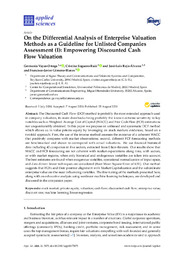Título :
On the Differential Analysis of Enterprise Valuation
Methods as a Guideline for Unlisted Companies
Assessment (I): Empowering Discounted Cash
Flow Valuation |
Autor :
Vayas-Ortega, Germania 
Soguero-Ruiz, Cristina 
Rojo-Álvarez, José Luis 
Gimeno Blanes, Francisco Javier |
Editor :
MDPI |
Departamento:
Departamentos de la UMH::Ingeniería de Comunicaciones |
Fecha de publicación:
2020-08 |
URI :
https://hdl.handle.net/11000/30608 |
Resumen :
The Discounted Cash Flow (DCF) method is probably the most extended approach used
in company valuation, its main drawbacks being probably the known extreme sensitivity to key
variables such asWeighted Average Cost of Capital (WACC) and Free Cash Flow (FCF) estimations
not unquestionably obtained. In this paper we propose an unbiased and systematic DCF method
which allows us to value private equity by leveraging on stock markets evidences, based on a
twofold approach: First, the use of the inverse method assesses the existence of a coherentWACC
that positively compares with market observations; second, different FCF forecasting methods
are benchmarked and shown to correspond with actual valuations. We use financial historical
data including 42 companies in five sectors, extracted from Eikon-Reuters. Our results show that
WACC and FCF forecasting are not coherent with market expectations along time, with sectors,
or with market regions, when only historical and endogenous variables are taken into account.
The best estimates are found when exogenous variables, operational normalization of input space,
and data-driven linear techniques are considered (Root Mean Square Error of 6.51). Our method
suggests that FCFs and their positive alignment with Market Capitalization and the subordinate
enterprise value are the most influencing variables. The fine-tuning of the methods presented here,
along with an exhaustive analysis using nonlinear machine-learning techniques, are developed and
discussed in the companion paper.
|
Palabras clave/Materias:
stock market
private equity
valuation
cash flow
discounted cash flow
enterprise value
discount rate
machine learning
linear regression |
Área de conocimiento :
CDU: Ciencias aplicadas: Ingeniería. Tecnología |
Tipo de documento :
info:eu-repo/semantics/article |
Derechos de acceso:
info:eu-repo/semantics/openAccess
Attribution-NonCommercial-NoDerivatives 4.0 Internacional |
DOI :
https://doi.org/10.3390/app10175875 |
Publicado en:
Applied Sciences Volume 10 Issue 17 (2020) |
Aparece en las colecciones:
Artículos Ingeniería Comunicaciones
|
 La licencia se describe como: Atribución-NonComercial-NoDerivada 4.0 Internacional.
La licencia se describe como: Atribución-NonComercial-NoDerivada 4.0 Internacional.
.png)
